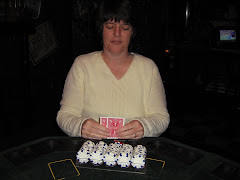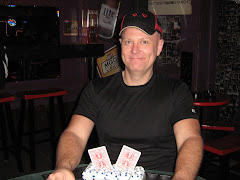Since we're going to start a couple of new games this week, I thought I'd post the rules for each. Draw is easy, not much to it. And while Omaha is about the same as Texas, it's harder than you think. And one variation on draw. The way we've played it before, you could only exchange 4 cards if you had an ace. We'll play according to the rules posted here, even though I've seen the 4 card max on several different web sites. So now you can trade in all 5 cards if your hand is that bad.
5 CARD DRAW
Draw Poker is the basic form of Poker and the place to start when introducing new players to the game. It's fairly uncommon these days in the casinos, but it is the form from which all other Poker games are derived.
The essence of Draw Poker is that the player builds a hand from 5 cards. After the initial round of betting the player may discard some or all of their cards and receive replacements. The players cards should never be revealed until the final Showdown, and are only then if absolutely necessary (more on that later). During the game, all cards are dealt and discarded face down.
There are two main things to learn when it comes to Draw Poker. The first is Poker's 5-card hands and their ranking. The second is the course of play including when and how to bet.
Poker Hands
A poker hand is made from the best arrangement of five cards and are ranked as follows, highest first:
Royal Flush: A-K-Q-J-10, all same suit
Straight Flush: any five consecutive cards, all same suit
Four-of-a-Kind: four cards, same value (eg. four 7's)
Full House: Three-of-a-Kind and a Pair
Flush: any five cards of the same suit
Straight: any five consecutive cards
Three-of-a-Kind: three cards, same value
Two Pair
Pair
No Pair: five dissimilar cards, mixed suit
There are no wild cards in Draw Poker. All suits are ranked equally.
The Course of Play
A round of Poker begins with determining the Dealer. The Deal usually rotates around the table from the right: if you've just dealt then the person on your left deals next.
The Ante
Once assigned, the Dealer receives the deck and shuffles. Each player pays the "ante" which is a small, flat fee you pay to purchase the right to play that round. If you don't ante it means you are "sitting out". These monies and all others in the game go into the center of the table in a pile called "the pot". Once the antes are in, the Dealer deals one card at a time, face down, to each player around the table, beginning on the Dealer's left. Then the second card is dealt to each player, and so on until each player has 5 cards, all face down.
Pass, Bet or Fold
Players pick up their cards and assess their hand. The player to the Dealer's left opens the betting round by either placing a Bet, indicating a Pass by placing no bet, or Folding by discarding their hand.
Call and Raise
The next player to the left now has the opportunity to Bet. Or they can Fold. If the previous players Passed then they can Pass too or place a Bet of their own. If other players have Bet and they wish to stay in the round they must Call by matching any outstanding bets. They can then Raise by placing a bet of their own.
The betting then moves to the next player on the left, then the next, and so on back to and including the Dealer.
Once the Dealer has placed their bet, the other players must Call any outstanding bets or Fold. Generally speaking, no Raises are permitted once the betting has passed around to the Dealer.
Discarding
Players may now Discard any or all of their cards based on their hopes of building a better hand. Cards are discarded face down and collected by the Dealer.
Replacements
The Dealer now deals each player, starting on the left, their replacement cards, face down.
As before the Player on the Dealer's left begins the betting and the betting proceeds around the table.
Again, the Dealer gets the final Raise. Then everyone else must Call or Fold. Finally, the remaining players are ready for the Showdown.
If at any time there is only one player left in the game they take the pot. This player is encouraged to keep their cards hidden and muck them to the Dealer.
Showdown
After the final betting round, and all the necessary Calls, the players still in the game have reached the Showdown. The player's hands are revealed. The best hand wins and the winner takes the pot.
If there are tied winning hands then the rank of the individual cards determines the winner. For instance Full House of Aces over Jacks beats a Full House of Kings over Jacks. If it's still a tie and there are no kickers (spare cards not used to build the final hand) then the pot is split.
If the rank of the individual cards doesn't determine the winner, then the kicker(s) of higher rank determines the winner. If it's still a tie, the pot is split.
If there are no "name" hands (all players have No Pair), then the highest ranking single card is declared the winning hand. If it comes to a dead tie (no clear winner, all cards same rank) then the pot is split.
Suit is never used to determine a winner in Poker.
OMAHA
Omaha Hi is a version of Texas Hold'Em where players are dealt four hole cards instead of two. But there's a catch: two and only two of the hole cards can be used in making the final hand. Omaha Hi is also known as Omaha Hold'Em or simply Omaha.
The four hole cards make Omaha a nine-card game and having more cards to choose from means players will typically finish with stronger hands. Poker players being the people that they often are, the possibility of higher hands typically means that players stay in longer and the pots will grow accordingly.
In practice, Hold'Em players will find that the focus in Omaha Hi tends more towards playing the cards than playing the other players.
Basic Rules
For the basics of Omaha, see our Texas Hold'Em rules. The only variations are:
the player is dealt four hole cards.
the player makes their final hand from two of the four hole cards and three of the five community cards.
Strategy
Since the name of the game in Omaha is to assemble the killer hand, it essentially becomes a drawing game. You take the possibilities you're dealt with the hole cards, determine what you can make out of it, watch the community cards as they fall with a careful eye on what they're doing to your chances and bail if it becomes clear that things are going sour. You can burn off a lot of chips hanging around to see if things improve.
The strategy guidelines for Omaha run into the dozens because of the number of cards in play and the two-from-four rule. To make a long story short, it's generally advised that you stay in if your hole cards integrate well --that is, they form the beginnings of several good hands-- and muck them if they don't.
Rookie Omaha players are often suckered in by a solid pack of hole cards or a strong string of community cards. Remember, Four to a Flush in the hole is useless because you only get to keep two of them. Ditto with the community cards. There is no point to betting on cards you can't keep so remember: two hole cards, three community cards, no exceptions, period.
Watch out for busted hands in the initial deal: two cards might start a Straight and the others a Flush, but there's no crossover in that you can't recombine the cards to form yet another hand, like a Straight Flush for instance. To avoid chasing rainbows, muck pairs of orphans unless they're top-nut beginnings.
Beware of "second nut" hands, those where even if you got what you needed it still wouldn't be a boss hand. Many an Omaha player has gone home with empty pockets and the haunting feeling that they should've learned something from the experience. Second nut is second place --if you're lucky-- and you should play accordingly.
Finally, don't stay in hoping things will get better. If the flop goes against you, muck out because if those three cards haven't helped you the chances are that nothing else will. The smart money says keep your chips for the next hand.
Monday, March 17, 2008
Subscribe to:
Post Comments (Atom)











No comments:
Post a Comment